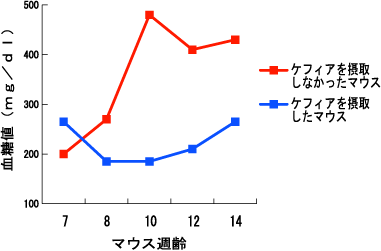In a study conducted by Kyushu University, the effects of NKG Kefir on blood glucose regulation were tested using a type II diabetes model mouse with a genetic leptin receptor deficiency.
Background
These mice lack the leptin receptor in the brain, resulting in:
-Uncontrolled appetite
-Rapid obesity
-Severe insulin resistance and hyperglycemia
This makes them a recognized model for advanced type II diabetes, often used in metabolic and pharmaceutical research.
Key Finding
When NKG Kefir was administered, researchers observed a strong suppression of elevated blood glucose levels, even in this extreme metabolic disorder model.
What It Means
The result suggests that NKG Kefir may influence glucose metabolism through:
-Gut microbiota modulation
-Improved insulin sensitivity
-Anti-inflammatory properties commonly associated with fermented foods
Potential Implications
-Shows promise for supporting metabolic health, particularly in individuals at risk of or currently managing type II diabetes
-Indicates a potential use for kefir in functional foods targeting blood sugar regulation
Conclusion
This research adds to the growing evidence that kefir is not only a source of probiotics but also a functional food with potential metabolic benefits, particularly for individuals with impaired glucose regulation or insulin resistance.
(Red = Kefir not consumed, Blue = Kefir consumed)

